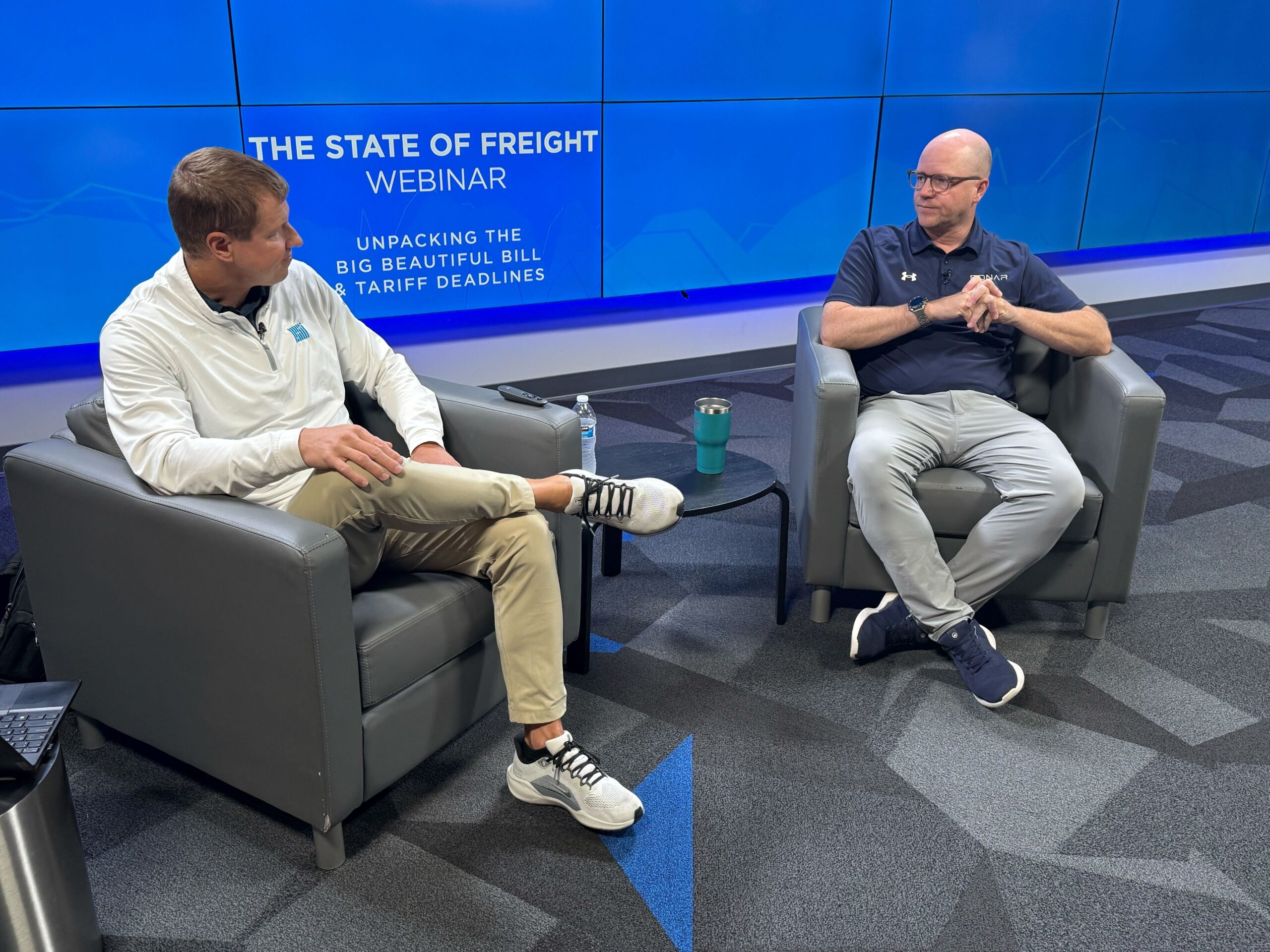
Tariffs have been the main focus of the recent installments of the monthly Webinar Freight, which is being held in relation to the sonar, but they took the rear seat to various locations this month.
What they say at these points – whether about the finances of the company and the number of demand and capacity – was the July Webinar focus with the freight waves and the CEO of Sonar Craig Fuller and Zac Stricland, the freight market manager of the cargo market. Here are five ready -made foods from Thursday’s session.
Two trends in sonar data show that it can sometimes reflect a degree of correlation, but now it does not do so: the overseas tender index (OTRI) is increasing, while the overseas tender (OTVI) index is declining.
OTVI reflects what is expected, given that everyone in this sector still see the transportation market as part of the recession. But OTRI is on the rise, a sign of capacity tightening as independent owner operators pull their trucks off the road and the fleet continues to disappear and unable to survive the current situation.
Fuller said the capacity has been in the climb for many years, “with the flood of new trucks, companies and drivers.”

But Stricland’s chart showed that the recent increase in the net revival of motor carrier officials was granted by the Federal Motor Safety Department (FMCSA).
Fuller said he believes that the implementation of English only has the effect of “deficit” on capacity. But if there is a housing market that leads to more transportation demand, it can become an important issue.

Stricland and Fuller discussed other reasons for the emergence of revocation, including the effects on drugs and alcohol homes. “This is a continuous thing that we really have to pay attention to,” said Stricland.
The season of income and what says
The July Webinar situation in the middle of the number of transport companies released its three -month reports. The performance of several companies for discussion, including Heartland Express (NASDAQ: HTLD), was involved, which brought another three months on Thursday.
Fuller noted that Heartland’s possessions have been a commodity truck business over the years, “based on long jobs in 1990, which is no longer there.”
He also spoke about the personal experience as a family member who founded us XPress, whose financial characteristics and problems were similar to what Heartland Express passes. We were eventually purchased by Knight Swift.
“Long trade for those truck loads is dead,” Fuller said. “Unfortunately, it seems that the heart of the heart does not seem to do it.”
US XPress is now part of Knight Swift (NYSE: KNX). In the second quarter’s report, Knight Swift said the United States saw XPress increased 300 base points last year. “Knight Swift has really proven that it can bring us back to the level of sustainability,” Fuller said, referring to the conflict with the Heartland campaign.
Short climb
The discussion of Heartland relationships with the long load of truck transportation led Strikland to show the chart from the sonar, which shows its index for short transportation against long -term activity. In general, long transport is run in a higher index, but in recent months this has happened.
Data are made from tender. The long business is more than 800 miles.
Fuller said he believes the change is part of the long -term trend. But he also said he believed that the Trump administration’s re -investment of the US economy could make this change.

But there is a threat to transportation, he said. Since the long segment of transportation market is more dependent on import activity, “so many of these are contained and go to rail.”
Across the country in the collection of songs of a company
Talks between the South Nyrfolk (NYSE: NSC) and the Pacific Ocean (NYSE: UNP), which creates the country’s first real intercontinental railroad, became the issue of the issue of transportation.
Describing the railway as a “dream trade”, Fuller noted: The profitability of the Pacific Union has sometimes exceeded Microsoft.
“This merger ends that makes them much more profitable,” he said. Asked who can benefit from a mergers in addition to the railway, Fuller said, “I argue that it rarely is a real integration in the benefit of carriers.”
However, integration between the two railroads, in the west and the NSC in the east, most likely will help large carriers such as Amazon. Human
Owners and brokers are likely to lose, but he added that large international carriers such as JB Hunt (NASDAQ: JBHT) or Hubgroup (NASDAQ: Hubg) will benefit, he said. “I think traditional rail transport, big players like coal or cereal, they are likely to lose because the quality of service will probably be deteriorating for them. But it must improve internationally.”
Revitalization of transportation technology
“One of the most exciting things that happen in transportation now is the revival of transportation technology,” Fuller said.
Prior to this epidemic, Fuller said there are many technology vendors that offer new products that have been invested by investment.
In his discussion, he only mentioned a specific company that has been active: Triumph Financial (NASDAQ: TFIN), who bought Greenscreens AI earlier this year and seeks to expand its information sector.
But beyond that, he said, “only a lot of transaction happens.” He described much of the work on the “next -generation” technology, such as the technology designed by artificial intelligence.
More articles by John Kingston
However, another broker’s responsibility, this time, adds to the growing composition in the fifth circuit
Many things happened in the triumph Financial in the quarter. USPS disputes resolved
Manhattan Associates Supply Software Provider increases after sharp growth of income